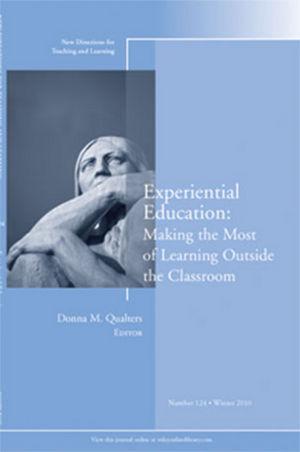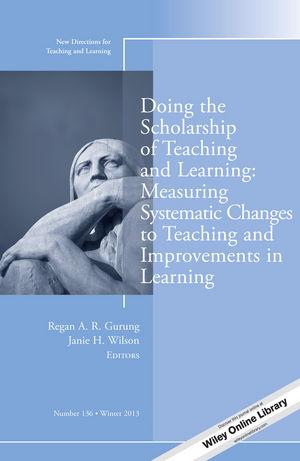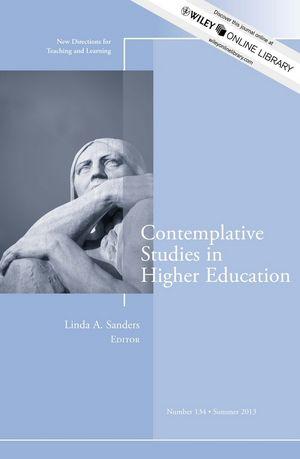Resources


The Scholarship of Teaching and Learning (SoTL) should be an integral part of every academic’s life, representing not only the pinnacle of effortful teaching, but also standing side by side with more conventional disciplinary scholarship. Although practiced by many instructors for years, SoTL has garnered national attention resulting in a spate of new journals to publish pedagogical research. SoTL helps students, fosters faculty development, and has been integrated into higher education. This volume provides readers with challenges that will motivate them to engage in SoTL and take their pedagogical research further. We include many key features aimed to help both the teacher new to research and SoTL and also researchers who may have a long list of scholarly publications in non-pedagogical areas and who have not conducted research. This is the 136th volume of this Jossey-Bass higher education series. It offers a comprehensive range of ideas and techniques for improving college teaching based on the experience of seasoned instructors and the latest findings of educational and psychological researchers. (From the Publisher)

The complexities of 21st-century life- personal, social, cultural, and environmental - demand thoughtful responses, responses fostered and enhanced through contemplative experience. Contemplative education includes studies of the history, psychology, and socialcultural context of such experience, as well as the development of experiential knowledge through one or more personal practices. Contemplative education has recently emerged in the academy. Although there has been significant published discussion of postsecondary courses and programs that incorporate contemplative views and practices, there have been few studies of relevant curricula and pedagogy. This volume integrates research, theory, and practice through a fusion of perspectives and approaches, giving readers the opportunity to review contemplative educational concepts and applications in academic, social, and institutional domains. This is the 134th volume of this Jossey-Bass higher education series. New Directions for Teaching and Learning offers a comprehensive range of ideas and techniques for improving college teaching based on the experience of seasoned instructors and the latest findings of educational and psychological researchers. (From the Publisher)

Journal Issue.
Sensitive issues, rife in religious studies and in theology, present a pedagogical challenge when teaching students to nuance their thinking around positions that are often sharply defined and elicit strong feelings. I developed a learning tool that I call the “Agency Paradigm.” The purpose of this tool is to help students comprehend diversity within religious traditions, particularly regarding the agencies of women who are committed to them. Drawing on the open and critical dialogue of emancipatory pedagogy, the Agency Paradigm encourages students to explore a range of ways women in world religions choose to act in varying contexts. This approach to teaching world religions increases students’ cognitive knowledge base and expands their understanding of each of the religions studied in the course, as examined through the perspective of differing women; it also assists them in developing their own agency through thoughtful reflection.
Sexual violence on campus is a major issue facing students, faculty, and administrators, and institutions of higher education are struggling to respond. This forum brings together three responses to the problem, with a focus on the religious studies classroom. The responses move from the institution to the faculty to the classroom, exploring three separate but linked spaces for responding to sexual violence. The first contribution (Graybill) critiques common institutional responses to sexual violence. The second contribution (Minister) advocates for long-term, classroom-based responses to sexual violence and describes a faculty/staff workshop response. The third contribution (Lawrence) emphasizes the classroom, examining the issues that arise when perpetrators of sexual assault are part of the student body. Read together, the pieces offer a comprehensive view of the complicated intersections of sexual violence, the university, and pedagogical issues in religious studies.
One page Teaching Tactic: To make theoretically dense, conceptually difficult readings more concrete and easier to discuss. This enables our class discussion to begin with something besides “I don't get it.”
One page Teaching Tactic: student presentations to practice culling important concepts from class discussion, encouraging students to see how course material connects from one class period to the next and practice posing readings-based questions.
One page Teaching Tactic: using Twitter for student discussions of films outside of class, teaches them to write thoughtful and critical comments in a succinct but expressive manner.
One page Teaching Tactic: a warm-up exercise requiring students to recall and synthesize course material by selecting what is applicable to a practical pastoral care setting that they might reasonably expect to encounter.
Wabash Center Staff Contact
Sarah Farmer, Ph.D
Associate Director
Wabash Center
farmers@wabash.edu